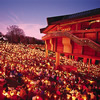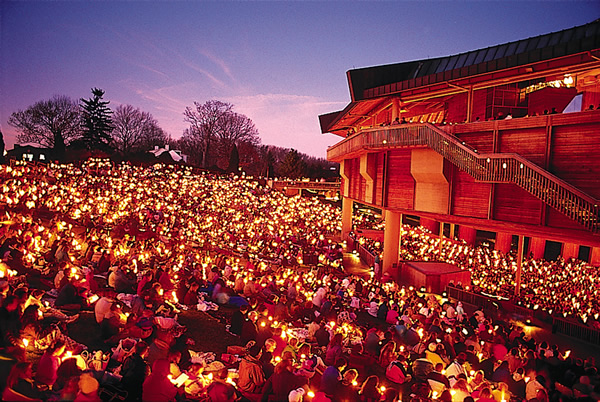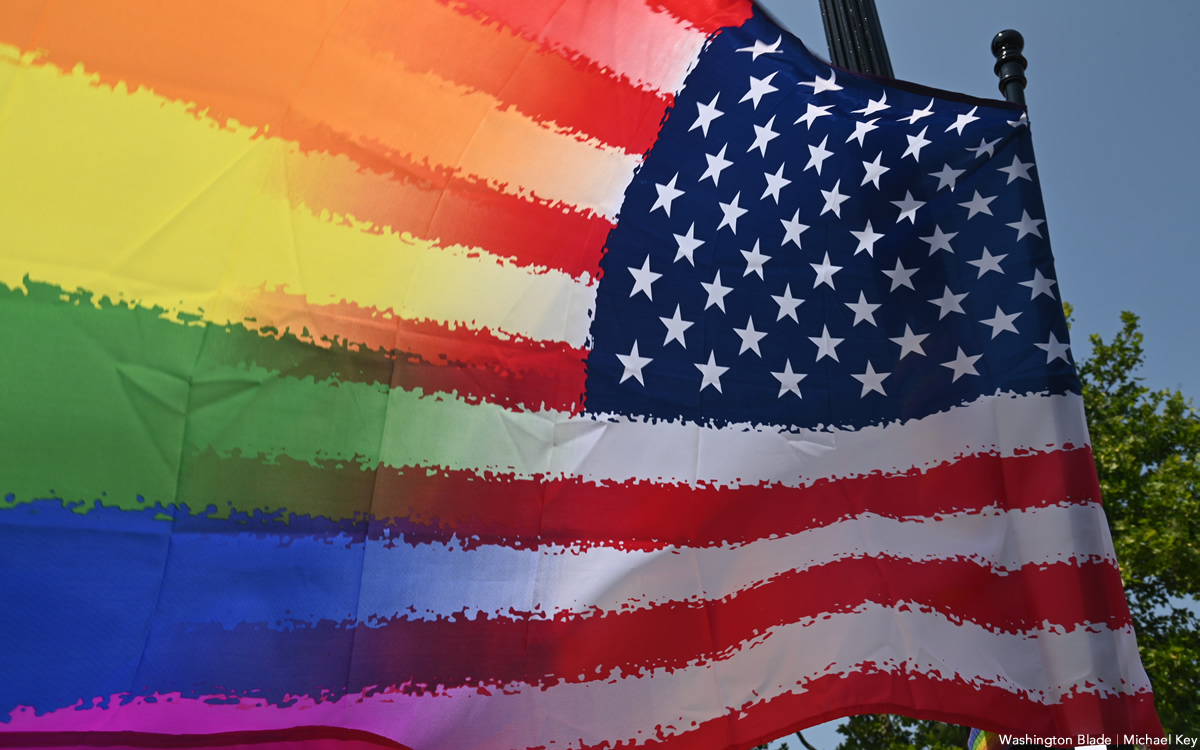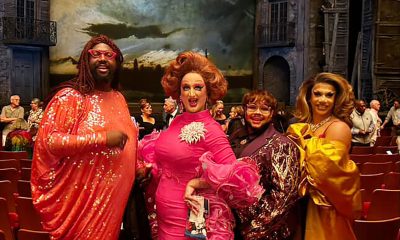Arts & Entertainment
Music of the season
Gay productions among upcoming holiday concerts and shows


Wolf Trap’s Holiday Sing-A-Long, featuring the U.S. Marine band and members of local choirs and vocal groups is Dec. 4. (Photo by Sam Kittner, courtesy Wolf Trap)
The holiday season has officially begun with Thanksgiving over and it’s time for holiday concerts and shows. Washington and the region have a rich bounty slated — you could go to concerts almost every night between now and Christmas and still not see everything.
The Gay Men’s Chorus of Washington has its annual holiday concert, “Red & Greene,” for four performances from Dec. 16-18 at Lisner Auditorium (730 21st St., N.W.) featuring Ellen Greene, Broadway’s original Audrey from “Little Shop of Horrors.” Tickets range from $25 to $50 and can be purchased at gmcw.org.
The Gay Men’s Chorus will also be joining Metropolitan Community Church of Washington for its “Joy All Over the World” Christmas concert at Lincoln Theater on Dec. 3. Oleta Adams will make a special appearance. Orchestra seats are $30; balcony seats are $20. This is lesbian music minister Shirli Hughes’ swan song with the church. Go to mccdc.com for more information or ticketmaster.com for tickets.
Wolf Trap (1645 Trap Rd.) in Vienna has two holiday shows coming up. Starting Wednesday is Steve Solomon’s “My Mother’s Italian, My Father’s Jewish & I’m Home for the Holidays.” Solomon uses impersonations to tell the story of a family reunion in his one-man show, the longest running one-man show in Broadway history. The show runs through Dec. 2. Tickets are $32 and can be purchased online at wolftrap.org.
Dec. 4 brings Wolf Trap’s free annual holiday sing-a-long featuring Christmas carols and Hanukkah songs by choir and vocal groups and the United States Marine Band.
The Kennedy Center (2700 F St., N.W.) has a bevy of different holiday performances and events coming up in December.
The American Ballet Theatre will be performing “The Nutcracker” from Dec. 8-11 featuring the Kennedy Center Opera House Orchestra, the Norwood Middle School Choir and the National Cathedral School Choir. Tickets range from $45 to $150.
The National Symphony Orchestra, conducted by Matthew Halls, will be performing Handel’s “Messiah” starting Dec. 15. The show will run through Dec. 18 and tickets range from $20 to $85.
Before the Orchestra’s performance, the Kennedy Center will have Yvonne Caruthers give a comprehensive history of “Messiah” performances throughout the years in “Searching for the Real Messiah” on Dec. 10 at 2 p.m. Tickets are $15.
Tickets for all Kennedy Center performances can be purchased online at kennedy-center.org.
The Cantate Chamber Singers will be giving their “Holiday in Venice” concert on Dec, 11 at St. Mark Episcopal Church (118 3rd St., S.E.) at 3 p.m.
If too much “Messiah”/”Nutcracker”-type traditionalism has you reaching for the eggnog, there are some less reverential offerings as well.
Gay filmmaker John Waters brings his eponymous Christmas show to the Birchmere on Dec. 18. Tickets are $45 at birchmere.com.
And the Kinsey Sicks, a “dragapella” beauty-shop quartet, are back in D.C. with their show “Oy Vey in a Manger” at Theater J (1529 16th St., N.W.) for four performances from Dec. 24-26. Tickets range from $25 to $65 and can be purchased online at theaterj.org.
The Bohemian Caverns Jazz Orchestra will be performing its holiday concert, “A Bohemian Christmas,” featuring holiday favorites re-imagined with a jazz bent, at The Mansion at Strathmore (10701 Rockville Pike) in North Bethesda on Dec. 18 at 5:30 and 7:30 p.m. Tickets are $20.
Grammy Award nominee Dave Koz, who’s gay, is coming to the Music Center at Strathmore (5301 Tuckerman Lane) in North Bethesda on Dec. 5 for his Christmas tour with special guests Rick Braun, Jonathan Butler and Candy Dulfer. The concert will feature songs from Koz’s holiday albums. The concert begins at 8 p.m. and tickets range from $38 to $72.
The Baltimore Symphony Orchestra will be performing “Holiday Cirque de la Symphonie” on Dec. 8 at the Music Center at 8 p.m. The concert will be performed on and above the stage.
The orchestra will also perform Handel’s “Messiah” on Dec. 3 at 8 p.m. featuring Edward Polochick and concert artists of Baltimore Symphonic Chorale.
Tickets for both Orchestra performances range from $28 to $88.
The National Philharmonic will also be performing Handel’s “Messiah” with two performances on Dec. 10 and 11 featuring Stan Engebretson conducting. Kids from 7 to 17 can attend this concert for free. Tickets range from $32 to $79. There will also be a free lecture before the concert on Dec. 10.
On Dec. 12, Pink Martini (featuring Thomas Lauderdale, who’s openly gay) will be performing at the Music Center at 8 p.m. Tickets range from $55 to $125 and can be purchased online at ticketmaster.com. All Strathmore tickets can be purchased online at Strathmore.org unless otherwise noted.
The BlackRock Center for the Arts (12901 Town Commons Drive) in Germantown will have the “Lift Every Voice: A Holiday Gospel Celebration” concert on Dec.3 at 8 p.m. featuring vocal performances by Solomon Howard, EXTOL and Nischka Higginbotham. Tickets are $25 and can be purchased online at blackrockcenter.org.
The Olney Theater (2001 Olney-Sandy Spring Rd.) has two holiday shows coming up in December. First up is “The Nutcracker” starting Dec. 9 and running through Dec. 24. This is the Olney Ballet Theatre’s 50th anniversary production of the show. And starting Dec. 14, Paul Morella returns to Olney with his performance of “A Christmas Carol: A Ghost Story of Christmas.” Tickets for all shows at Olney start at $26 and can be purchased by calling the box office at 301-924-3400.
The Christ Church Episcopal (118 N. Washington St.) in Alexandria has “A Festival of Nine Lessons and Carols” on Dec. 4 at 5 p.m. The traditional service will feature hymns and anthems, including music by gay composters Joel Martinson, Richard Webster and David Ashley White. This is a free event, but an offering will be taken to benefit the music program at Mount Vernon Woods Elementary School. A wine-and-cheese reception will follow the performance.
D.C. Different Drummers’ holiday concert is Dec. 11 at the Columbia Heights Education Campus Auditorium (3101 16th St., N.W.) at 3 p.m. The performance will include music from D.C. Swing!, the Capitol Pride Symphonic Band and several of the groups small ensembles, almost all of whom are LGBT. Tickets to the concert are $21 for adults and $11 for students and seniors and can be purchased online at dcdd.org.

The Rainbow History Project will host “Pickets, Protests and Parade Exhibit Tour” at 7 p.m. at Freedom Plaza. This event honors the courage, resilience and resistance of D.C.’s gay community. For more details, visit Eventbrite.
Go Gay DC will host “LGBTQ Community Social” at 7 p.m. at Hyatt Centric Arlington (1325 Wilson Blvd.). This fun event is ideal for meeting new people and community building. Attendance is free and more details are available on Eventbrite.
Xavier Entertainment DC will host “Cowboy Carter Afterparty” at 10 p.m. at Nellie’s Sports Bar. There will be fireworks, parades, and patriotic fun. For more details, visit Eventbrite.
Mezcal Amaras will host “Sha Boing Boing Showdown” at 6 p.m. at Snappy’s Small Bar (3917 Georgia Ave., N.W.). Get ready to test your hotdog eating abilities. Tickets start at $12.51 and can be purchased on Eventbrite.
Illusions Drag Queen Show will host “Drag Queen Dinner Show” at 7 p.m. at 2323 18th St. N.W. Guests will be treated to the very best celebrity drag impersonations in entertainment. Tickets start at $12.97 and are available on Eventbrite.
Thurst Lounge will host “A Thirsty Cowboy Afterparty” at 5 p.m. DJ Apollo will be performing. For more details, visit Thurst’s website.
9:30 Club will host “Gimme Gimme Disco: A Dance Party Inspired by ABBA” at 9 p.m. The DJ will play plenty of disco hits from the 70s and 80s. Tickets cost $45.30 and can be purchased on Ticketmaster.
a&e features
Doug Spearman takes his chance
‘Noah’s Arc: The Movie’ debuted on Paramount+ last month

There’s no question that when Patrik-Ian Polk’s series “Noah’s Arc” premiered on Logo 20 years ago, it was a groundbreaking creation. The story of a group of Black gay men and their wonderful friendship. The titular arc was that of the cute main character, Noah (Darryl Stephens), and his close-knit circle of friends, including Chance played by gay actor Doug Spearman. This compelling and loving fraternity may, in fact, be what brought viewers back repeatedly, including a 2008 movie, “Noah’s Arc: Jumping the Broom,” as well as the 2020 “Noah’s Arc” short, and now, a new full-length feature “Noah’s Arc: The Movie,” debuting on Paramount+ on June 20. In the movie, filled with equal measures of laughs and tears, Chance, who has faced a devastating loss, finds his dependable friends there, ready to support and comfort him at a moment’s notice. I had the pleasure of speaking with Spearman the morning of the streaming premiere of “Noah’s Arc: The Movie.”
WASHINGTON BLADE: Doug, since the early 2000s, when the “Noah’s Arc” series premiered on Logo, you have been playing the character of Chance, including in the latest installment, “Noah’s Arc: The Movie.” What was it about Chance that appealed to you as an actor?
SPEARMAN: When Patrik (-Ian Polk) called me to ask me to play him (Chance), I was at JFK airport in the baggage claim, waiting for a suitcase. He explained what the part was. The thing that stuck out to me was the fact that Chance was in a long-term relationship with another Black man. And, they had a child; they had a 4-year-old daughter named Kenya. I had never seen two Black gay men raise a child on TV before. I thought it was the most revolutionary thing I’d ever seen. I immediately thought I’ve got to do this because that was something nobody had seen. I thought it was incredibly important to take the part.
BLADE: “Noah’s Arc: The Movie” was, once again, written and directed by Patrik-Ian Polk, who you just mentioned, is the creator of the entire franchise. What’s the secret to your long-standing working relationship?
SPEARMAN: [Laughs] the whole team, all of us, are like a band of brothers. We fight like brothers, we come together like brothers, we hash things out, we talk, because we’re all very different from our characters. I think the challenge of playing these guys and then uplifting these men, playing a part, especially something written by Patrik, is like solving a math equation. There’s always a challenge that’s enjoyable for me as an actor: to try to find out what it is that Patrik wants, and then how do I do it.
BLADE: I think you do a very good job of it.
SPEARMAN: Thank you very much
BLADE: In the years between “Jumping the Broom” and the new full-length movie, many changes have occurred, and the story addresses some of them, including gay widowhood, which is something that the aging community is now confronting, as well as mental health issues. Please say a few words about how you approached those subjects in the new movie.
SPEARMAN: I had a lot of loss in my life, right before we started shooting. Two months before we started shooting the first series, my mother died. I was going through the grief process through that whole first season. Since then, I’ve lost a lot of people in my life. In fact, when we started shooting the second season, the second week we were shooting, my ex died of a heart attack. I was having to fold that into what I was doing with my life on the set and off the set. You’ve got to show up and you’ve got to do your work. The first two seasons of “Noah’s Arc” are always tinged with the memory of grief. So, when I had to deal with the death that Chance faces (in the new movie), which is a significant death in his life, it wasn’t that hard to reach back, especially the scene in the graveyard. It was something that I unfortunately could pull from personal experience.
BLADE: Shifting gears, the movie features delightful cast surprises, including Jasmine Guy and TS Madison. Did you have a chance to interact with either or both when they were on set?
SPEARMAN: No, I didn’t have any scenes with Jasmine, and I missed her. I wish I had gotten to see her because I actually got to direct Jasmine for a CBS promo shoot for “Queen,” back in the early ‘90s. I had a huge crush on her when she was on “A Different World.” So, I really would have liked to reconnect. But TS and I got to see each other every day because I was in all her scenes. It was extraordinary being around somebody like that. That is one outspoken woman!
BLADE: Even though Beyoncé never makes an appearance in the movie, there’s a lot of talk about her. Would you say you are a Beyoncé fan?
SPEARMAN: Yes! I’m breathing! Yes, I’m a Beyoncé fan. I actually got the chance to meet her. I knew her mom. Her mom was extraordinary to me. She is in the second movie I directed. She also gave us a wedding gown to use in the very first scene of the movie. That family is extraordinarily important to me. Not only just to be a fan, but to be somebody who’s gotten to know them and work with them and see how hard they work. I don’t think anybody works as hard as Tina or Beyoncé.
BLADE: There was a recent news item about gay actor Benito Skinner of the Amazon Prime series “Overcompensating” being told not to bother auditioning for straight roles. As an out actor yourself, how important do you think it is for queer characters to be portrayed by queer actors, and vice versa?
SPEARMAN: Being queer is a multifaceted identity. There’s no one kind of queer person. I think finding the best actor that’s your first circle of casting. I think one of the joys about being an actor is that you get to play different parts. I play straight guys all the time. Dads and husbands and things like that. I think a lot of people are told not to do it. In fact, I wouldn’t be Chance if the actor who was originally cast as Chance hadn’t been pulled out of the series by his agents because they didn’t want him to play a gay character.
BLADE: That’s amazing! Thank you for sharing that. Without giving away too much, the ending of the movie is a little ambiguous, even ending with a question mark. If there was a “Noah’s Arc: The Movie” sequel, would you come back for that?
SPEARMAN: Yeah! A lot of it would depend on what Chance’s journey is going to be like. Patrik and I have conversations like that all the time. He’s very interested and supportive of input. I hope I would be, as we all would be, part of the creative growth with these characters. They live in Patrik’s head, and he writes them, but we’re the ones who have to flesh them out. It’s a conversation, it’s always a conversation.
BLADE: You are currently performing in Molière’s “The Imaginary Invalid” as part of the New Orleans Shakespeare Festival at Tulane. What has this experience been like for you?
SPEARMAN: It’s extraordinary! I started on stage when I was seven. There’s nothing like working with a live audience and having that immediacy. I’m working with an extraordinarily talented cast in a really great play, and I have some of the best scene partners I could ever want.
BLADE: Are there any upcoming film or TV projects you’d like to mention?
SPEARMAN: I’m still a writer, and I’m still a director, and I’ve still got scripts that I would like to make. I have a little something that’s a cross between “Treme” and “Bridgerton” that I want to do. I’m always trying to figure out what the next thing is.
Photos
PHOTOS: Montgomery County Pride in the Plaza
LGBTQ celebration held in downtown Silver Spring

Montgomery County Pride in the Plaza was held on Sunday, June 29 at Veterans Plaza in Silver Spring, Md.
(Washington Blade photos by Michael Key)









































